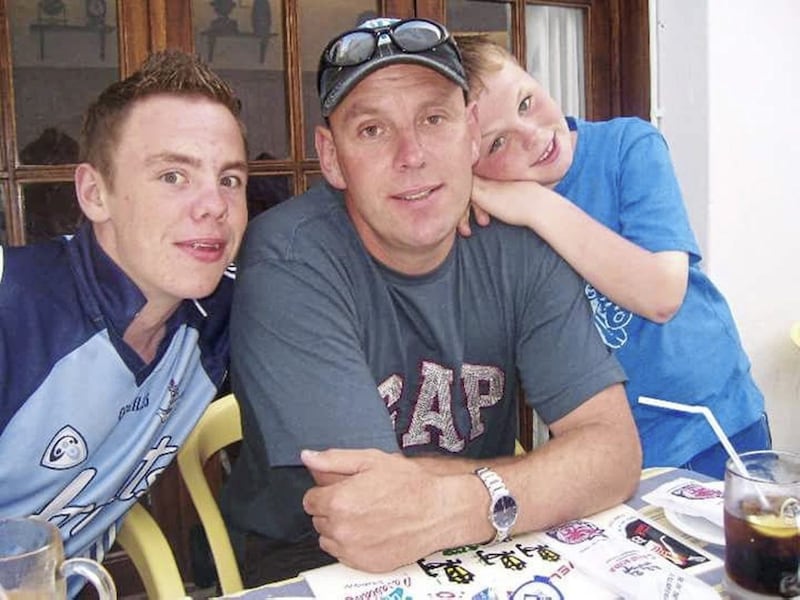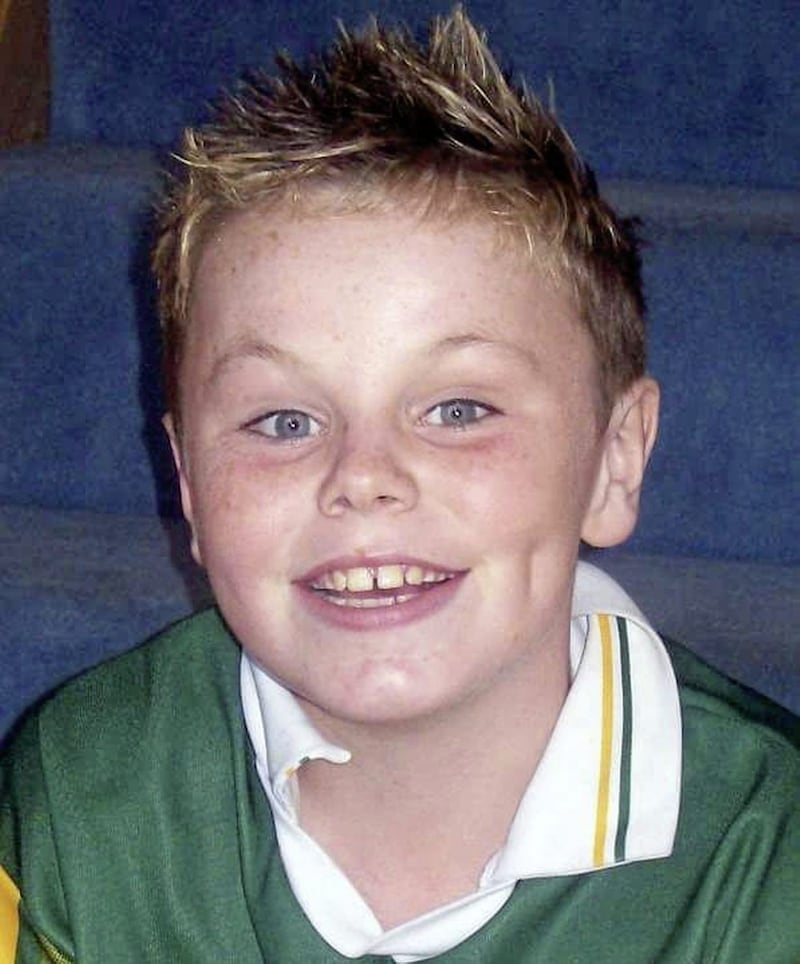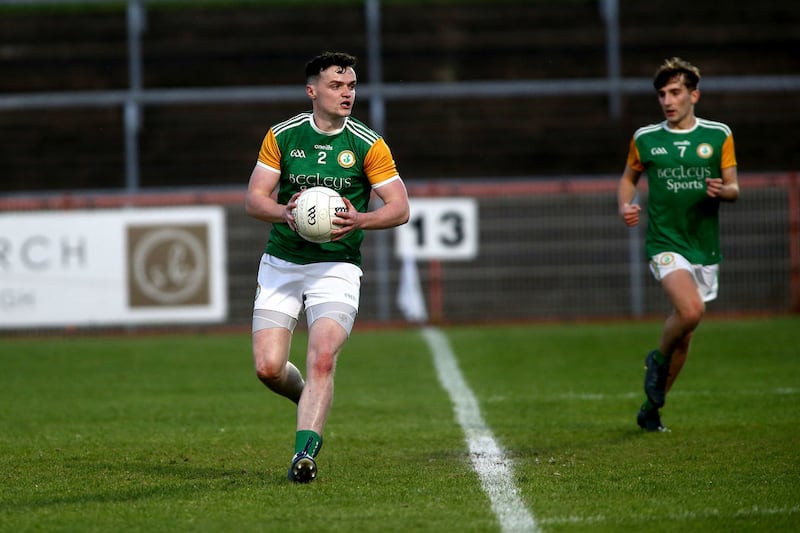CIAN Corrigan was a happy 11-year-old who enjoyed playing footballer for Dungannon Thomas Clarke GAA Club and making people laugh. But when he woke up one Monday morning with a pain in his arm, life was quickly turned on its head for the Corrigan family.
"We thought he had slept on it and sent him off to school," Cian's dad, Jarlath, recalls. "When he came home that evening he told us 'You are going to have to take me to the doctor', that everyone was laughing at him in school because he couldn't catch the ball.
"His mother asked him to raise his arm above his head and he couldn't and we took him straight down to Craigavon. They carried out a number of tests and didn't find anything and told us they wanted him back on the Friday. He was sitting the 11-plus that weekend and they said it would wait until Monday.
"We started to get frightened when they told us they wanted to carry out an emergency MRI as they thought there was something wrong with his neck."
The MRI showed Cian had a blockage in his spine. Events for the Corrigans quickly went "out of control", as Jarlath puts it. Cian was transferred immediately to the Royal Children's Hospital, where he would spend 100 days in intensive care.
Three weeks after being admitted, Cian's parents, Jarlath and Rachael, were told he had a rare and incurable glioblastoma – the most aggressive cancer that begins within the brain.

"Cian had a brain tumour in the spinal cord, just behind his mouth at the base of the brain. It was that rare it had to go to a worldwide panel of experts for them to diagnose it as they hadn't seen it before," explains Jarlath.
Initially his family were told Cian only had two weeks to live – but he defied all odds and lived a further seven weeks, passing away at home in May 2009.
Although it's almost nine years on, the grief is still difficult for Cian's parents and his siblings Shane, who was 17 when Cian died, Saoirse who was 11 and Caoimhe, who was just two.
"You play back the video in your head and it just's so surreal and hard to accept what happened," Jarlath says.
"Cian was an amazing child. After he died his school teacher asked his class to write a letter describing Cian, which they gave to us. We didn't actually know this but Cian had a little saying: "Pull your frown upside down." There were a lot of foreign national kids starting to live in Dungannon and joining his school and he would be very welcoming. He was a real joker and just wanted to make other kids laugh and smile."
All loss is hard, but there is something about child-loss that puts it in a unique category. Parents are simply not supposed to outlive their children and as well as mourning the loss of his or her life, they are mourning the loss of their potential and future.

While Jarlath admits his life has been changed forever, he is now in a position to realise that it's not over and encourages others who find themselves in the same circumstances that they can come out the other side.
However, his journey through grief was not an easy one as he succumbed to society's pressure on fathers to show strength at times of adversity.
"The days before we buried Cian people were telling me to stay strong for Rachael and the children and get the family back on track, blah, blah, blah. I didn't give myself space to grieve then and it caught up with me a year later and it floored me and I nearly had a breakdown.
"I didn't know if it was anger, grief or guilt. I couldn't focus on anything and felt so helpless, seeing my other son Shane's pain and not being able to take it away from it," says Jarlath, who had to give up his job as a construction contracts manager.
Jarlath turned to his GP and was referred for counselling. While it started to help him understand what he was going through, he just didn't connect with a counsellor who told him "I can't imagine what you are going through". It wasn't until he attended an Anam Cara parent support group in Armagh that he finally felt he could "take off the mask" and "open up".
Finding other parents who were walking the same road as themselves helped both Jarlath and his wife Rachael, who are still involved in the organisation as volunteers.
"I was among people who were going through something similar and that was the common bond. I wasn't being judged and I was being listened to," says Jarlath about the all-Ireland organisation that provides online and face-to-face peer support services to bereaved parents.
"Grief never goes away. Even now you still get moments, when certain things drag you back there, and I do wonder what type of footballer Cian would be now and if he would have made the senior panel. But Anam Cara showed us there is life at the end of the tunnel."
Jarlath cherishes his memories of Cian and marks anniversaries through family meals or lighting lanterns.
"You are not forgetting your child that has died. You are just carrying on with your life," he says.
His advice to fathers who find themselves in the same position he did is to not be ashamed to show your vulnerability, but to seek support and face their grief.
"A father's loss is different to a mother, who has carried the baby for nine months in her womb, but we have lost too. There is no shame. With grief you have to go through it, you just can't go around it."
On Tuesday January 30 Anam Cara, in conjuction with the Northern Ireland Children's Hospice, will be holding a bereavement information evening in Newtownabbey. The free event is opened to all bereaved parents in the community, regardless of the age of their child or the circumstances of their death.
The guest speaker, Peter McCartan, a senior medical social worker and registered systemic family therapist will speak on the many challenges families may face after the death of their son or daughter including gender differences in facing loss, the impact on siblings and the milestones on the journey through this unique grief and the small supports that can make the journey a little easier.
:: If you are interested in attending the event in Corr's Corner Hotel at 7.30pm, rsvp by January 29 to info@anamcara.ie or telephone 028 9521 3120.




